Fix Piano Student Slouching with Chin Tucks
This post may contain affiliate links. If you purchase something through an affiliate link, I will receive a small commission at no cost to you. For more information, read the disclosure statement here.
In this age of extreme technology, I’ve noticed so many more problems with piano student slouching. I’ve also seen bad posture habits forming in myself as a teacher.
With so many piano students (and teachers) spending so much time on our devices every day, students are developing rounded shoulders and a hunched back.
Teachers are complaining of back pain, neck pain, and shoulder pain from spending hours each day teaching online piano lessons.
We’re twisting at the waist, sitting partially turned towards the screen, and we’re exhibiting overall poor piano posture.
I interviewed my physical therapist, Dr. Stephanie Elkins, to see how we can prevent these pain and posture issues and address piano student slouching.
In this 4-part series, Dr. Elkins is answering my questions about the causes of “Tech Neck”, the rounded shoulders and hunched back that are part of the cause of piano student slouching.
She also shows us how to strengthen the weak muscles that contribute to back and neck problems.
Additionally, she will show us how we can reverse the painful issues that stem from spending so much time sitting in front of our devices with less than ideal posture.
The rest of this article is in interview format. Please enjoy this informative and enlightening question and answer session between Stephanie and I. Did I mention Stephanie is my amazing younger sister? #proudbigsister
Legal Disclaimer: This article is not intended to be medical advice. It is intended for demonstration purposes only and should not be used to self-diagnose or self-treat any condition.
Consult with your own medical professional before starting any new exercise program.
You agree to hold harmless this site and all individuals involved in the publication of this article for any damages resulting from the use or misuse of this article’s content.
Use of any content in this article is at your sole risk.
What Is Tech Neck?
Melody: Let’s start with a term and a definition. What is the actual term for “tech neck”, the piano student slouching and hunched shoulders we’re seeing more and more often?
Stephanie: The term is thoracic kyphosis with forward head posture.
Kyphosis happens where the thoracic vertebrae develop a curve from being weak, instead of being stacked on top of each other when the muscles are strong.
Melody: Over the past several months, I’ve noticed visible changes in my own piano students.
I wanted to figure out how to help them with this issue before it becomes a permanent issue causing lots of pain and medical expenses.
Why does our posture get worse as we spend more time on our devices?
Stephanie: Slouching, also called “tech neck”, is a learned posture, even piano student slouching.
Think about how perfect the posture of babies is, until they get older and learn how to sit with poor posture and slouching.
People sit in their beds to play games on their iPads. They sit in their recliners after work and play on their phones. They slouch on their sofas to watch movies.
But slouching and poor posture are not permanent.
They can be reversed and prevented, unless the person has a certain type of birth defect or a specific medical condition.
Causes of Tech Neck and Piano Student Slouching
Melody: What causes piano teacher and piano student slouching?
Stephanie: Slouching generally starts with weak cervical muscles (tech neck) and then dominoes down the back.
When you relax your shoulder blades, they fall forward, and you develop weak cervical muscles and weak middle traps.
When you have weak cervical muscles, your head comes forward which causes your shoulders to become more rounded and posture to become more poor.
This is what causes piano student slouching.
Women are generally more likely to experience slouching issues due to weaker periscapular musculature secondary to female anatomical development and physical maturation.
Melody: How do we address these issues?
Stephanie: These issues can easily be addresses through muscular strengthening and a focus on postural control.
Addressing the Neck to Help Piano Student Slouching
Stephanie: First we’ll address the neck with chin tucks, which help our cervical extensors.
Melody: How are chin tucks going to help tech neck and piano student slouching?
Stephanie: Chin tucks strengthen the muscles of the neck.
When you are in the forward flexed posture called tech neck, the muscles in the back of the neck are in a stretched position all the time.
Because they are stretched, they’re not being used to their capacity, so we must strengthen them in order to improve piano student slouching.
Otherwise, if you don’t work to strengthen them, the longer they’re in the stretched position, the weaker they’re going to become.
If you’re sitting in that slouched tech neck posture four to eight hours a day, every day, those muscles are going to become severely weakened.
How to Perform Chin Tucks
Stephanie: To perform chin tucks correctly, I always tell my patients it’s like you’re doing the funky chicken, or like you’re giving yourself a double chin.
You’re lying on a comfortable yoga mat, the floor, etc., pushing the chin straight back into the flat surface you’re lying on.
You’re not tilting your chin, you’re pushing it straight back.
You’re pressing the entire back of your neck into the flat surface. Make sure there is no forward tilt of your nose.
Repetitions
Do a set of 10, and hold each chin tuck for 5 seconds. Repeat 2-3 times a day.
A special thank you to Kacee Rose, LPTA, for demonstrating the correct performance of this exercise in the following video.
Recommended Equipment:
To address piano student slouching and give your back and neck some strength, these are some of Stephanie’s and Melody’s favorite pieces of exercise equipment and equipment for online piano lessons.
Other resources for piano teachers
Don't miss out!
Follow us on Facebook and Instagram, join our Facebook group for piano teachers, and subscribe to the newsletter to get helpful teaching tips, resources, and tutorials delivered straight to your inbox every week.
Stephanie Elkins
Stephanie Elkins
Welcome!
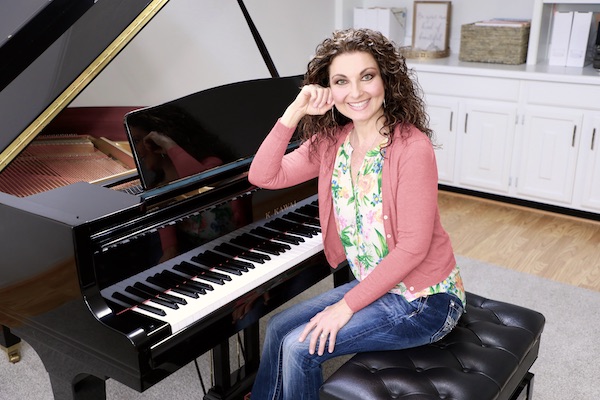
Hi! I’m Melody Payne, a pianist and piano teacher, educational resource author, a fun-loving wife to the most wonderful and talented hubby I could ask for, and a lifelong learner who loves to share. I want to make your life as a music teacher easier by writing and sharing helpful and relevant music teaching articles, and by creating educational resources with your very own students in mind. If you are a parent who wants to enroll your child in piano lessons, I’d love for us to get started building those skills that can give your child a lifetime of musical enjoyment!

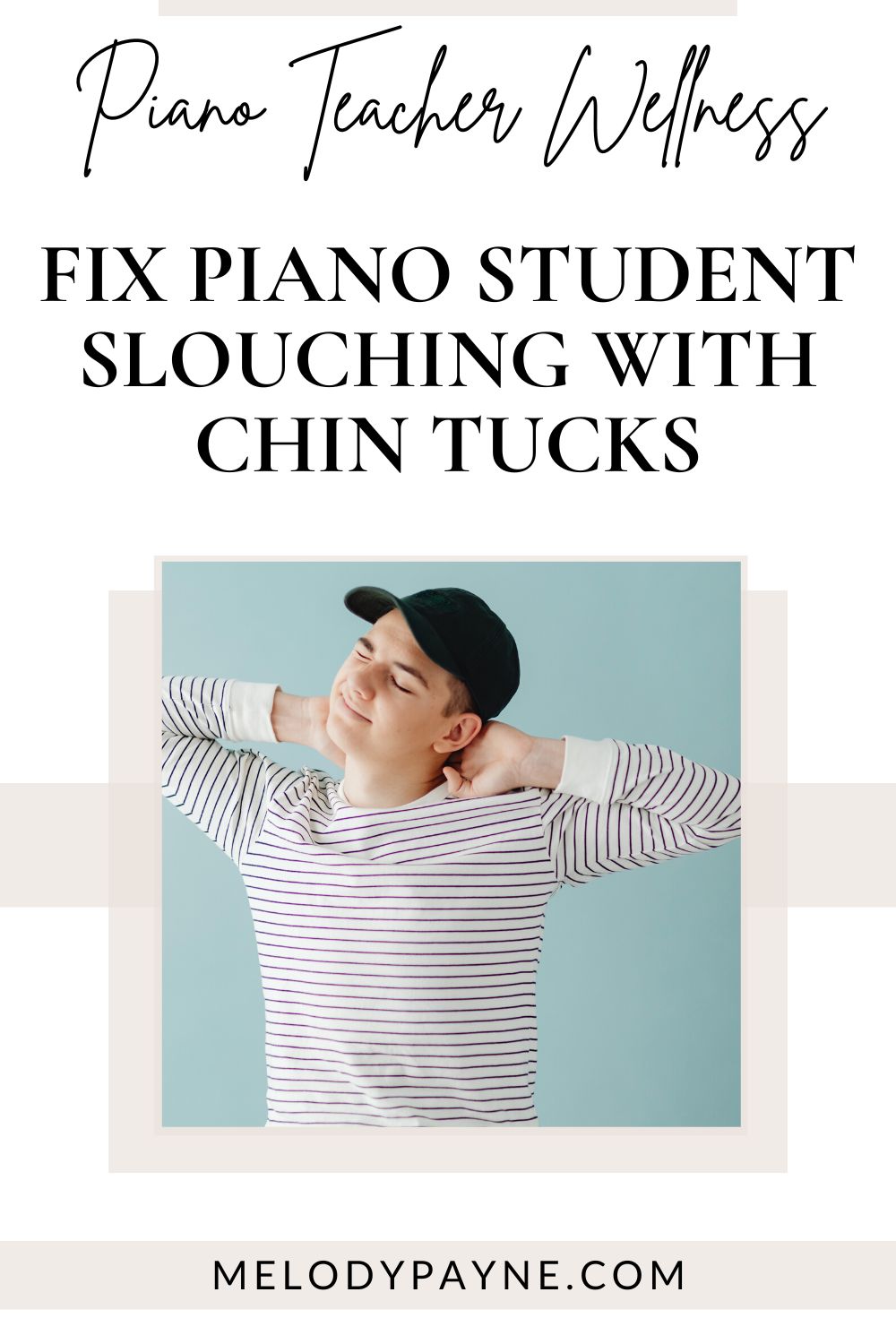
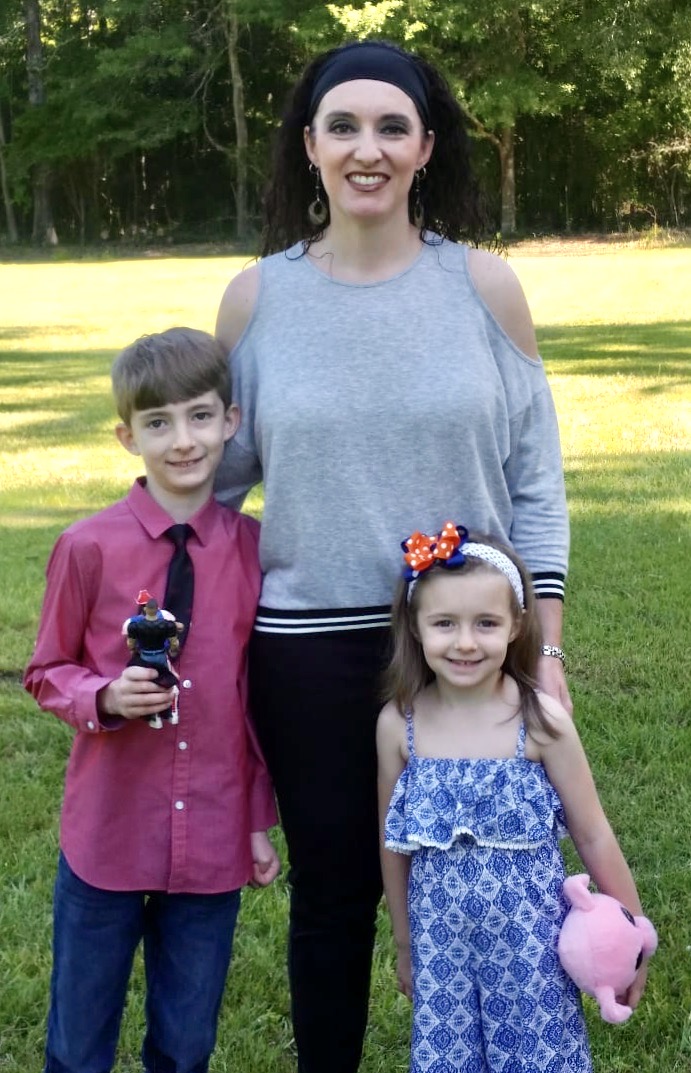

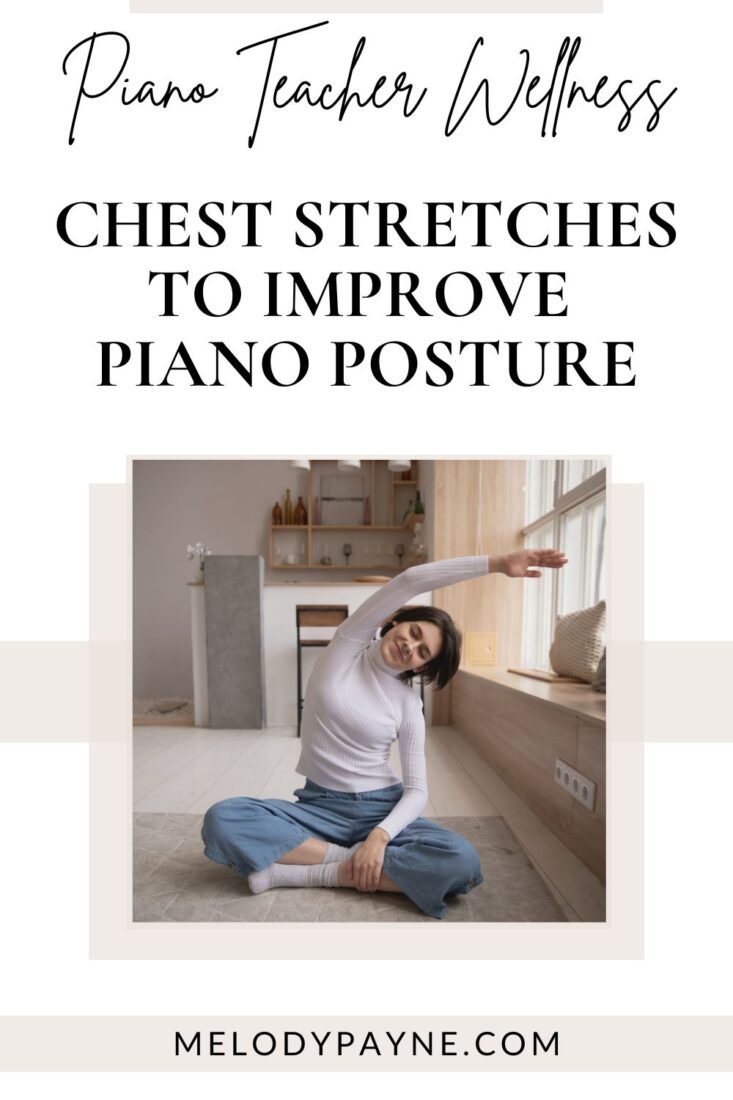

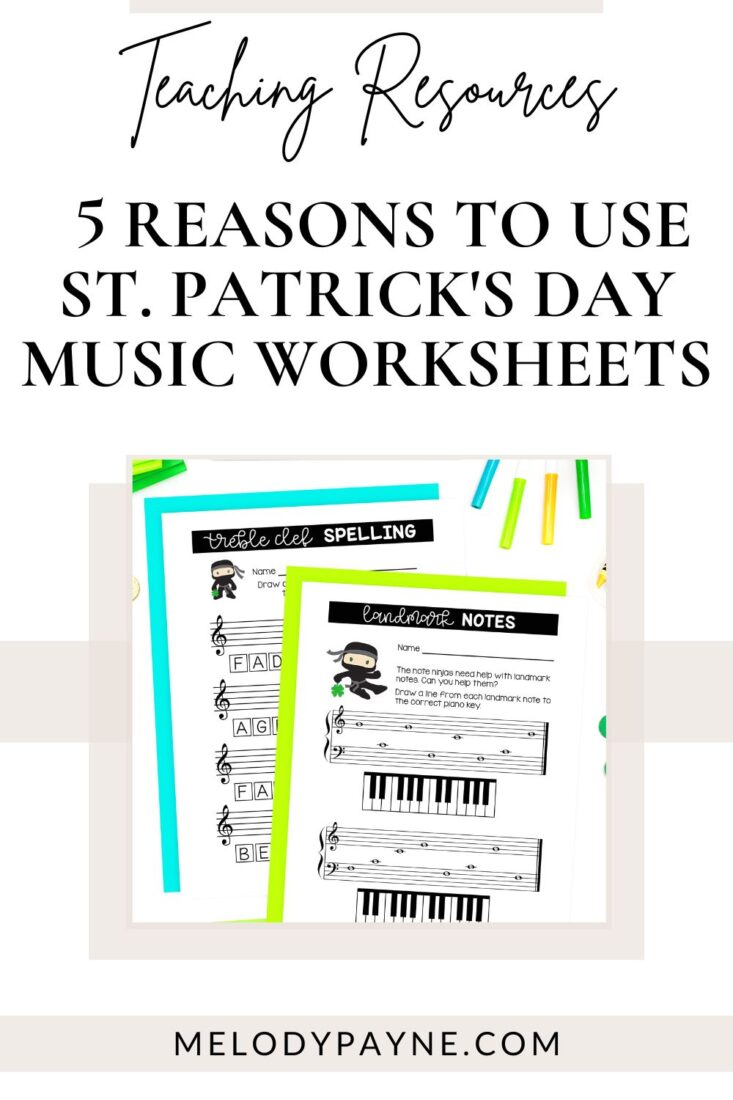

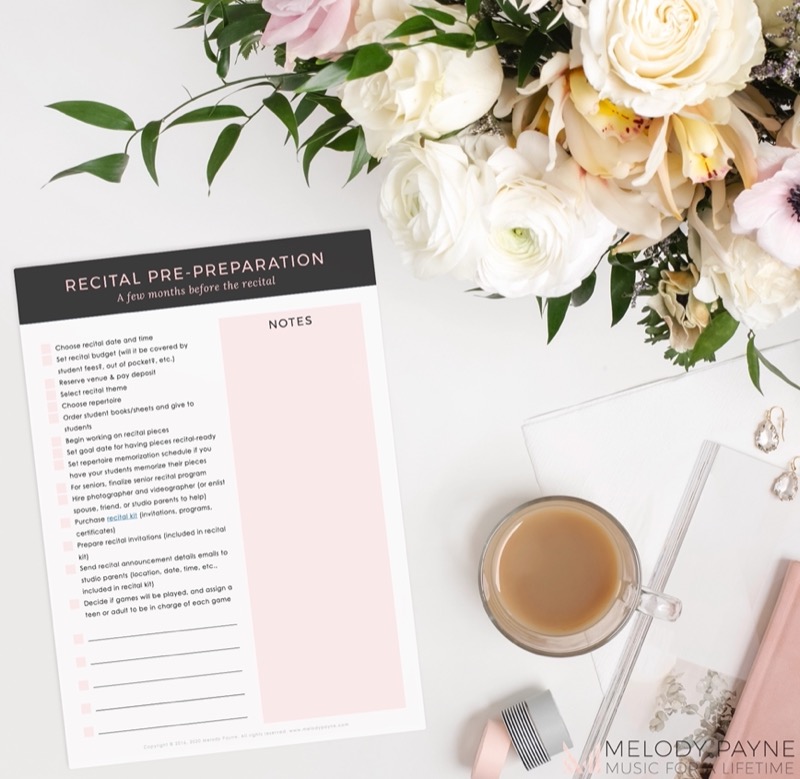
This Post Has 4 Comments
Thanks so much. Physical Therapy for sports people is so accepted. We musicians need it so much as well.
We sure do! And the more time we’re using our devices and sitting in front of our computers for online piano lessons, the more we need to listen and pay attention to our bodies when they’re trying to tell us they need help. Thanks so much for your comment!
What a fabulous topic for a post! Thank you, Melody and Stephanie! This is much needed information.
Thank you so much, Janna! I agree with you – this information is definitely needed and can help all of us do a better job keeping ourselves healthy and comfortable when we’re at the piano, as well as when we’re not. My PT is awesome!